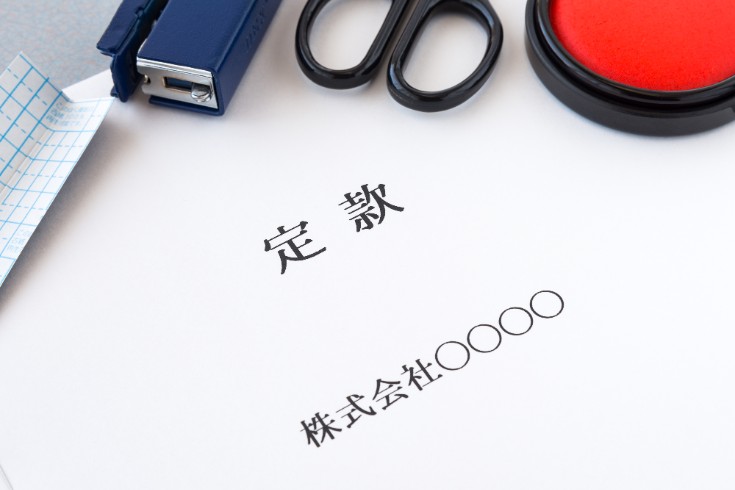Legal Explanation on Drafting Articles of Incorporation for Establishing a Company in Japan

In the process of establishing a company in Japan, drafting the Articles of Incorporation is not merely a procedural step. The Articles of Incorporation are a legal document that defines the organization, operation, and fundamental rules of the company, often referred to as the “constitution of the company.” How this document is designed and created has a profound impact on the governance structure, decision-making processes, and future growth potential of the company after its establishment. The provisions of the Articles of Incorporation have a powerful legal effect, binding shareholders, directors, and the company itself, and their creation requires compliance with the strict rules set forth by the Japanese Companies Act. This article starts with the basic structure of the Articles of Incorporation under Japanese corporate law, explaining in detail the legally required items that must be included, the items that need to be specified to have certain effects, and the optional items that can reflect the individuality of the company. In particular, we focus on critical issues that directly connect to management decisions, such as the interpretation of the “purpose” that defines the scope of the company’s business activities and the complex regulations surrounding “in-kind contributions,” which are investments made with property other than money. Finally, we provide a comprehensive legal knowledge base for building the foundation of a company establishment by detailing the essential certification procedures that ensure the drafted Articles of Incorporation have legal effect.
The Basic Structure of Articles of Incorporation: Three Types of Provisions
Under Japanese Corporate Law, the provisions included in the articles of incorporation are classified into three categories based on their legal nature. These are “mandatory provisions,” “optional provisions,” and “voluntary provisions.” This three-tiered structure reflects the legislative intent to ensure a minimum legal framework common to all companies while allowing each enterprise to flexibly design its governance according to its specific circumstances.
Mandatory provisions, as the name suggests, are items that must be included in the articles of incorporation. If any of these provisions are missing or if their content is legally invalid, the entire articles of incorporation become void, and the establishment of the company itself is not recognized. This is because they contain essential information for identifying the company’s basic identity, such as its trade name, purpose, and head office location, which are indispensable for ensuring transaction safety.
Next, optional provisions do not affect the validity of the articles of incorporation if they are not included. However, if a company wishes to establish rules regarding these matters, they must be included in the articles of incorporation to have legal effect. For example, provisions restricting the transfer of shares or stipulating the establishment of a board of directors fall into this category. These often differ from the default rules set by Japanese Corporate Law, so including them in the articles of incorporation, the company’s supreme norm, clarifies their effectiveness and binds all shareholders and stakeholders.
Finally, voluntary provisions belong to neither of the two categories above and can be determined at the company’s discretion, as long as they do not contravene Japanese Corporate Law, other mandatory statutes, or public order and morals. For instance, the definition of the fiscal year or the timing of the regular shareholders’ meeting can be mentioned. While these matters can also be set in internal company regulations other than the articles of incorporation, including them in the articles elevates the importance of these provisions and requires strict procedures, such as a special resolution at the shareholders’ meeting, for changes, thereby ensuring management stability. Therefore, deciding which items to include in the articles of incorporation as which category is a crucial strategic decision that looks ahead to the future operation of the company.
Essential Elements at the Core of a Company
The essential elements are the most crucial information that forms the foundation of a company’s corporate personality. Article 27 of the Japanese Companies Act stipulates the following five items that must be included in the articles of incorporation of a stock company:
- Purpose
- Trade name
- Location of the head office
- The value or minimum amount of property contributed at the time of establishment
- Names or denominations and addresses of the incorporators
Among these, the specification of the ‘purpose’ is particularly important as it legally defines the scope of the company’s activities. The company’s purpose must possess legality, profitability, and clarity. However, there is a notable divergence between legal theory and practical demands regarding the interpretation of this ‘scope of purpose’.
The Supreme Court of Japan, in its decision known as the Yawata Steel Works case (Supreme Court Grand Bench decision, June 24, 1970), has consistently indicated that while a company’s right to act is limited to the purposes specified in its articles of incorporation, the scope should be interpreted broadly. According to case law, a company’s actions extend not only to the purposes explicitly stated in the articles but also to ‘all acts directly or indirectly necessary’ for accomplishing those purposes. This interpretation focuses on protecting third parties who engage in transactions with the company and ensuring the safety of those transactions. If a company’s actions were strictly limited to the scope of its purposes, parties to transactions would always bear the burden of verifying whether the transactions fall within the scope of the other company’s articles, hindering smooth economic activity.
However, this legally broad interpretation does not apply in all practical situations. For example, when obtaining financing from financial institutions, if the business subject to the loan is not explicitly stated in the articles’ purpose, the review process may become complicated. Additionally, in industries such as construction or staffing services, where administrative approval is required to conduct certain businesses, having the business content listed in the purpose of the articles is a prerequisite for approval. During tax audits, there is also a possibility that expenses arising from a business not listed in the articles may not be recognized as company expenses.
Therefore, even though the legal scope of a company’s activities is broadly recognized, it is a wise strategy to include not only the current business activities but also those that may be developed in the future, as specifically and comprehensively as possible in the purpose of the articles, to prevent practical obstacles and ensure smooth business operations.
Requirements for the Effectiveness of Relative Provisions in Articles of Incorporation
Relative provisions are items that, while respecting the autonomy of a company, may have a significant impact on stakeholders such as shareholders and creditors. Therefore, their inclusion in the articles of incorporation is required for these provisions to be legally effective. If they are not included in the articles of incorporation, even if they are resolved at a shareholders’ meeting, they will be legally invalid.
Examples of common relative provisions include stipulations on the transfer restrictions of shares, the establishment of boards of directors and corporate auditors, and the appointment of a shareholder registry administrator. These provisions allow for a company’s unique arrangements in place of the uniform rules of the Japanese Companies Act, but due to their importance, they are required to be included in the articles of incorporation, the fundamental rules of the company.
Among the relative provisions, those subject to particularly strict discipline are the ‘special establishment matters’ as defined in Article 28 of the Japanese Companies Act. This term signifies matters related to an ‘irregular’ establishment that differs from the usual monetary contributions. The following four items are included as special establishment matters:
- Contributions in kind: Contributions made with property other than money
- Property acquisition: A contract promising that the promoters will acquire certain properties after the company’s establishment
- Remuneration and other special benefits for the promoters: Economic benefits received by the promoters as a reward for their efforts in establishing the company
- Costs related to the establishment borne by the corporation
What these matters have in common is the risk that the company’s financial foundation could be compromised by the discretion of the promoters during the vulnerable stage of establishment when there is no independent decision-making body. For example, if assets of low value are overvalued for contributions in kind, or if promoters receive excessively high remuneration, the capital of the newly established company becomes nominal, and a ‘shell company’ without substantial value may be created.
To prevent such situations and ensure the financial foundation of the company, the principle of ‘capital adequacy’ must be upheld. The Japanese Companies Act requires these special establishment matters to be included in the articles of incorporation and, as a general rule, mandates an investigation by an inspector appointed by the court, thus establishing multiple layers of checks and balances.
The Essence of In-Kind Contributions in Company Establishment and Their Legal Regulations Under Japanese Corporate Law
In the realm of company establishment matters, in-kind contributions are the most frequently utilized and are subject to the most detailed regulations. An in-kind contribution is a system where assets such as real estate, vehicles, or intellectual property rights are contributed instead of cash, and in return, shares are issued. This offers the advantage of being able to enhance a company’s capital using owned assets, even when cash on hand is limited.
However, to ensure the objectivity of valuations and prevent the unjust inflation of capital value, Japanese Corporate Law imposes strict regulations on in-kind contributions. These regulations are based on the fundamental principle of ‘capital adequacy,’ which aims to secure the financial foundation of the company and protect creditors.
Firstly, when making an in-kind contribution, it is mandatory to detail this in the articles of incorporation according to Article 28, Paragraph 1 of the Japanese Corporate Law. Specifically, it is necessary to clearly state the name of the contributor, the assets being contributed and their value, and the number of shares to be allocated to that contributor.
Secondly, as a general rule, after the articles of incorporation are authenticated, one must apply to the court for the appointment of an inspector and undergo an investigation of the asset values by this inspector (Japanese Corporate Law Article 33). This procedure is time-consuming and costly, thus imposing a significant practical burden.
Therefore, Japanese Corporate Law provides exceptional cases where this rigorous inspector investigation is not required. In practice, most in-kind contributions are made using these exceptions. The exceptions are mainly recognized in the following three cases:
- When the total value of the in-kind contribution assets stated in the articles of incorporation is 5 million yen or less.
- When the contributed assets are marketable securities with a market price, and the value stated in the articles of incorporation does not exceed that market price.
- When the value stated in the articles of incorporation is certified as appropriate by professionals such as attorneys, certified public accountants, or tax accountants (however, if the property is real estate, an appraisal by a real estate appraiser is also required).
Thirdly, Japanese Corporate Law has established a system for retrospective liability. Article 52 of the Japanese Corporate Law stipulates that if the actual value of the in-kind contribution assets at the time of the company’s establishment is ‘significantly less’ than the value stated in the articles of incorporation, the promoters and directors at the time of establishment are jointly and severally liable to pay the company the shortfall (liability for compensation of value). This liability is a strict liability that does not depend on the presence of fault and is quite severe. Professionals who provided the valuation are also jointly and severally liable unless they can prove that they were not negligent. The Osaka High Court decision on February 19, 2016, is a case where the responsibility of an attorney who provided a valuation of in-kind contribution assets was questioned, highlighting the seriousness of the liability that professionals bear.
In this way, Japanese Corporate Law prevents the abuse of in-kind contributions and substantively ensures the principle of capital adequacy through a triple regulation of articles of incorporation, prior inspection, and subsequent liability.
Voluntary Provisions Reflecting a Company’s Individuality Under Japanese Corporate Law
Voluntary provisions are rules that a company can optionally include in its articles of incorporation, aside from the mandatory and relative provisions, to facilitate smooth operations. These items do not become legally invalid if they are not included in the articles of incorporation; they can also be established in subordinate regulations such as board of directors’ rules. However, deliberately including them in the articles of incorporation, the company’s highest norm, carries significant meaning.
To amend provisions included in the articles of incorporation, a special resolution at the shareholders’ meeting is generally required. This means that shareholders with a majority of voting rights must be present, and more than two-thirds of the voting rights of the attending shareholders must approve. This is a far more stringent requirement compared to internal regulations that can be easily changed by a board resolution.
Therefore, deciding which items to include as voluntary provisions in the articles of incorporation is a strategic decision that balances the ‘flexibility’ and ‘stability’ of management. For example, the following are commonly established as voluntary provisions:
- Timing for convening the regular shareholders’ meeting
- Number of directors and auditors
- Method for determining executive compensation
- Fiscal year
In particular, for joint ventures with multiple shareholders or companies that have received investment from external investors, ‘fixing’ specific operational rules as voluntary provisions in the articles of incorporation can be an effective means to protect the rights of minority shareholders and ensure compliance with agreements among founders. For instance, by specifying the number of directors in the articles of incorporation, it is possible to prevent majority shareholders from unilaterally changing the composition of the board. In this way, voluntary provisions function as a governance tool that reflects the company’s individuality and the dynamics between stakeholders, helping to prevent future disputes.
The Final Stage of Articles of Incorporation Creation: Authentication Procedures
In the establishment of a stock company in Japan, the articles of incorporation (original articles) created by the incorporators must be authenticated by a notary public to be effective, as stipulated by Article 30, Paragraph 1 of the Japanese Companies Act. This authentication procedure is a crucial process that ensures the clarity of the articles, prevents future disputes, and officially certifies that the articles were created through lawful procedures.
There are two methods of authentication: the traditional “paper-based authentication” and the modern “electronic articles authentication.” The most significant difference between the two lies in the cost, particularly regarding the presence or absence of stamp duty. Paper-based articles are subject to stamp duty under the Japanese Stamp Duty Act, requiring the affixing of a 40,000 yen revenue stamp. On the other hand, electronic articles, being electronic data, do not fall under the category of “documents” and are therefore not subject to this stamp duty.
However, to create and authenticate electronic articles, specialized equipment such as software for electronic signatures, IC card readers, and electronic certificates stored on My Number cards are necessary. If these are prepared individually from scratch, the initial investment may exceed the savings from stamp duty. Therefore, especially for one-time company formations, it is often more cost-effective and time-efficient to enlist professionals such as judicial scriveners or attorneys who already have an electronic authentication environment in place.
The table below summarizes the main differences between paper authentication and electronic authentication.
| Item | Paper Authentication | Electronic Authentication |
| Notary Fee | 30,000 to 50,000 yen, depending on the amount of capital | 30,000 to 50,000 yen, depending on the amount of capital |
| Stamp Duty | 40,000 yen | Not required |
| Copy Fee | Approximately 250 yen per page | 700 yen, etc., for the provision of the same information |
| Required Equipment, etc. | Not required | Electronic certificate, IC card reader, signature software, etc. |
| Procedure Overview | Visit the notary office for authentication | Application possible online |
As the table shows, electronic authentication has a clear advantage in that it does not incur stamp duty, but technical preparation is necessary to enjoy this benefit. It is important to choose the most suitable method according to your company’s situation.
Summary
As detailed in this article, the Articles of Incorporation are not merely one of the founding documents but are the most crucial document that defines a company’s legal identity, governance, and the core of its business operations in Japan. On the mandatory framework of absolute provisions, companies can design strategic institutional structures through relative provisions and weave unique operational rules through optional provisions, thus creating a tailor-made ‘constitution’ for each company. In particular, balancing the legal interpretation and practical demands when defining the ‘purpose’ that sets the company’s business scope, and the complex regulations surrounding ‘in-kind contributions’ that embody the principle of capital adequacy, are challenging without specialized knowledge. Accurately understanding these provisions and reflecting them in the Articles of Incorporation is essential for building a strong foundation that minimizes future legal risks and achieves sustainable growth.
At Monolith Law Office, we have a wealth of experience in dealing with the themes discussed in this article for numerous clients within Japan. Our firm is home to bilingual attorneys with Japanese legal qualifications, as well as several English-speaking attorneys with foreign legal qualifications, enabling us to provide finely-tuned legal support tailored to the unique needs of clients operating in international business environments. From the creation and certification of the Articles of Incorporation to the establishment of governance structures post-establishment, we offer optimal solutions based on specialized expertise at every stage.
Category: General Corporate





















